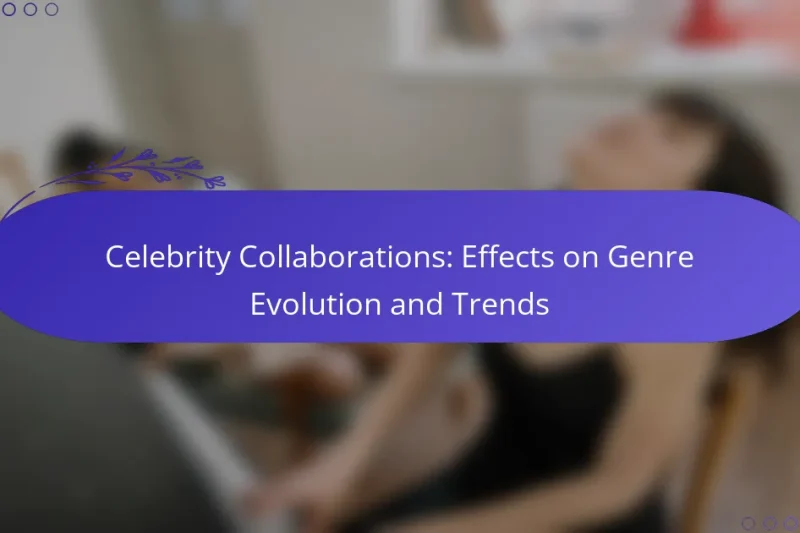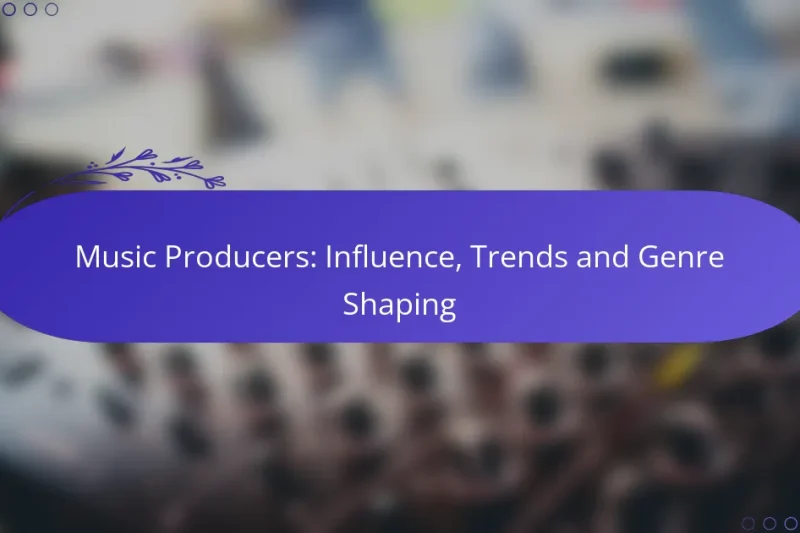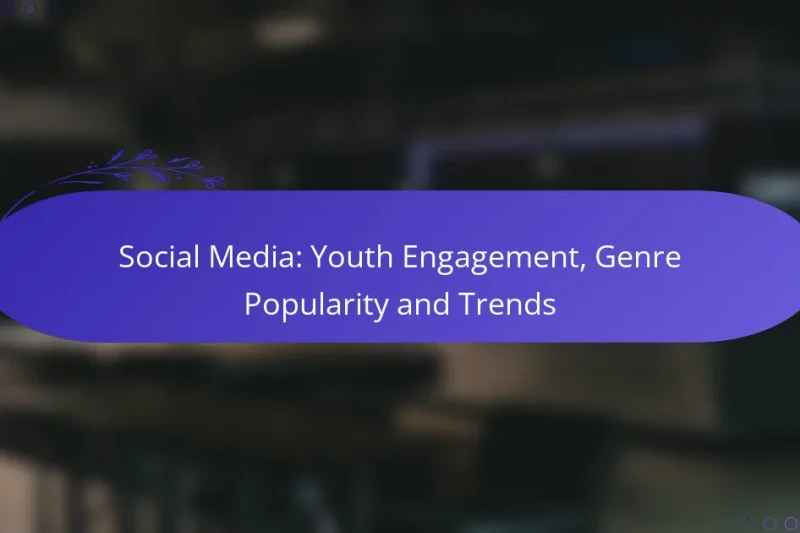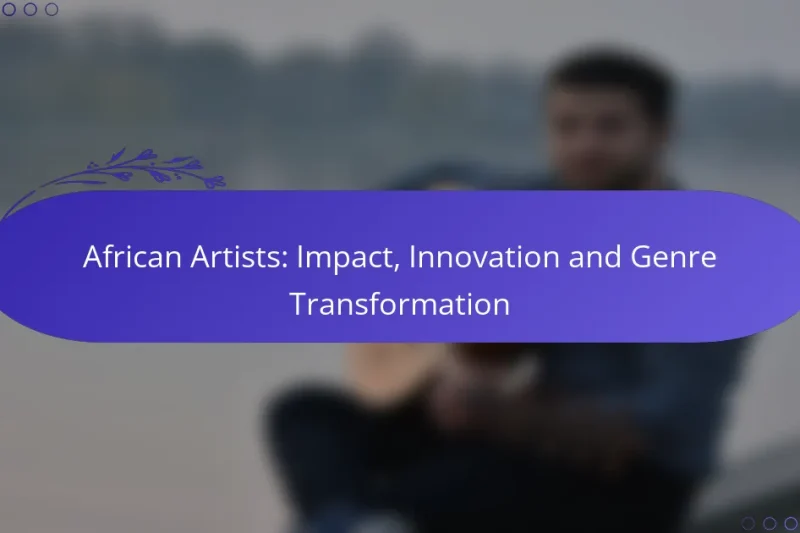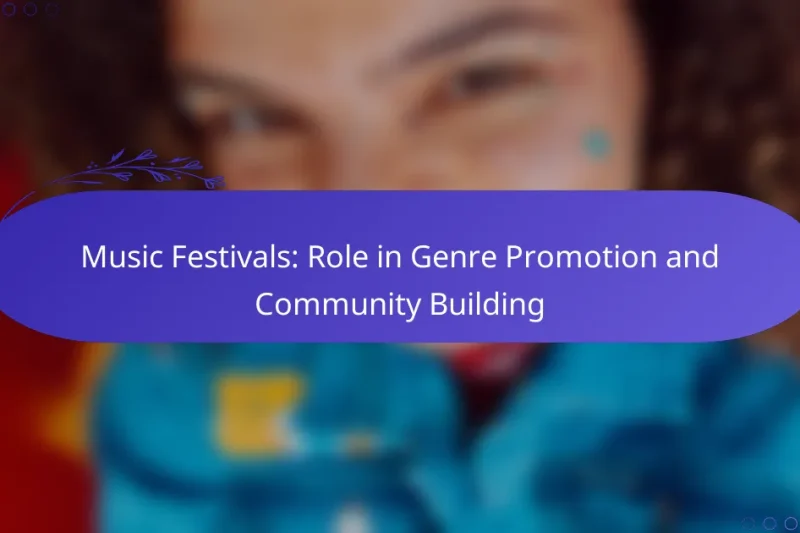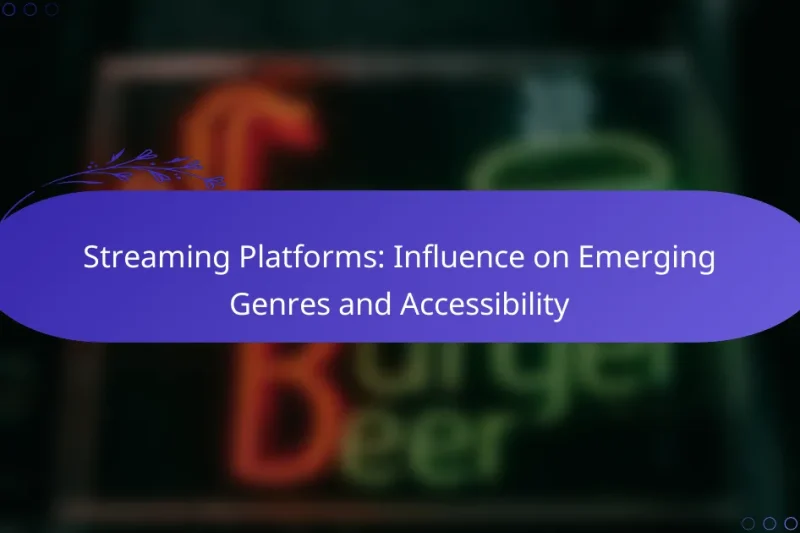Celebrity collaborations play a crucial role in the evolution of music genres by pushing artists to … Celebrity Collaborations: Effects on Genre Evolution and TrendsRead more
Genre Evolution: Key Influencers
Genre evolution has profoundly impacted the music landscape in the United States, influencing styles, cultural movements, and listener preferences. As genres blend and transform, they create innovative sounds that mirror societal changes and technological advancements, driven by key influencers such as artists, record labels, and social media platforms.
Music Producers: Influence, Trends and Genre Shaping
Music producers are essential architects of sound, influencing genre trends through their creative choices in arrangement … Music Producers: Influence, Trends and Genre ShapingRead more
Social Media: Youth Engagement, Genre Popularity and Trends
Social media has become a vital space for youth engagement, with platforms like Instagram, Snapchat, and … Social Media: Youth Engagement, Genre Popularity and TrendsRead more
African Artists: Impact, Innovation and Genre Transformation
African artists are at the forefront of a transformative movement in music and visual arts, blending … African Artists: Impact, Innovation and Genre TransformationRead more
Influencer Impact: Comparative Analysis Across Music Genres
The influence of social media personalities on music genres has become a pivotal aspect of modern … Influencer Impact: Comparative Analysis Across Music GenresRead more
Music Festivals: Role in Genre Promotion and Community Building
Music festivals serve as vital platforms for promoting specific genres and fostering community engagement among fans … Music Festivals: Role in Genre Promotion and Community BuildingRead more
Streaming Platforms: Influence on Emerging Genres and Accessibility
Streaming platforms have transformed the landscape of entertainment by promoting emerging genres and fostering innovation in … Streaming Platforms: Influence on Emerging Genres and AccessibilityRead more
How has genre evolution impacted music in the United States?
Genre evolution has significantly shaped the music landscape in the United States by influencing styles, cultural movements, and listener preferences. As genres blend and transform, they create new sounds that reflect societal changes and technological advancements.
Influence of rock and roll
Rock and roll emerged in the mid-20th century, blending elements of rhythm and blues, country, and jazz. This genre not only revolutionized music but also became a symbol of youth rebellion and cultural change in America.
Key figures like Elvis Presley and Chuck Berry helped popularize rock and roll, leading to the rise of iconic festivals and a vibrant music scene. The genre’s influence can still be seen in contemporary music, where its spirit continues to inspire new artists.
Rise of hip-hop culture
Hip-hop culture began in the 1970s in urban neighborhoods, combining music, dance, and visual art. It has grown into a dominant genre, influencing fashion, language, and social issues across the United States.
Artists like Grandmaster Flash and Tupac Shakur paved the way for hip-hop’s mainstream success, addressing themes of identity, struggle, and community. Today, hip-hop remains a powerful voice, shaping cultural narratives and trends.
Impact of electronic music
Electronic music gained traction in the late 20th century, driven by advancements in technology and the rise of dance clubs. Genres like house, techno, and dubstep have transformed the music scene, appealing to diverse audiences.
Festivals such as Electric Daisy Carnival and Coachella showcase electronic artists, highlighting its popularity. The genre’s ability to blend with others has led to innovative collaborations and a dynamic listening experience.
Role of pop music trends
Pop music trends often reflect societal changes and consumer preferences, making it one of the most adaptable genres. Artists like Madonna and Michael Jackson have set benchmarks in pop, influencing fashion and music videos.
Current trends often incorporate elements from various genres, creating a hybrid sound that appeals to a broad audience. This blending of styles keeps pop music relevant and continuously evolving.
Effects of streaming platforms
Streaming platforms have transformed how music is consumed, allowing for instant access to a vast array of genres. Services like Spotify and Apple Music have changed the dynamics of music distribution and discovery.
These platforms enable artists to reach global audiences without traditional gatekeepers, fostering genre experimentation. However, they also create challenges in terms of revenue distribution and artist visibility, as competition increases.
What are the key influencers in genre evolution?
Key influencers in genre evolution include artists, record labels, music festivals, and social media platforms. Each of these elements plays a significant role in shaping musical styles and trends over time.
Influential artists like Bob Dylan
Artists such as Bob Dylan have profoundly impacted genre evolution by blending various musical styles and introducing new lyrical themes. Dylan’s incorporation of folk, rock, and blues not only redefined these genres but also inspired countless musicians to experiment with their sound.
His ability to address social issues through music has encouraged other artists to explore deeper narratives, leading to the emergence of subgenres focused on storytelling and activism.
Record labels shaping genres
Record labels play a crucial role in genre evolution by promoting specific styles and artists. Labels often invest in particular genres, helping to refine their sound and expand their audience. For instance, Motown Records was instrumental in popularizing soul music in the 1960s.
By signing diverse artists and producing genre-defining albums, record labels can significantly influence the direction of music trends and the development of new genres.
Music festivals promoting diversity
Music festivals serve as platforms for diverse genres and artists to showcase their work, fostering genre evolution. Events like Coachella and Glastonbury feature a wide range of musical styles, encouraging cross-genre collaborations and exposure to new sounds.
These festivals not only highlight emerging artists but also create a space for established musicians to experiment, leading to the blending of genres and the birth of new musical movements.
Impact of social media on trends
Social media has transformed how music is consumed and shared, significantly impacting genre evolution. Platforms like TikTok and Instagram allow artists to reach global audiences quickly, often leading to the rapid rise of new genres or subgenres.
Through viral challenges and trends, social media can propel songs into mainstream culture, influencing what genres gain popularity and how they evolve over time. Artists who effectively leverage these platforms can shape the musical landscape in real-time.
How do cultural movements influence genre evolution?
Cultural movements significantly shape genre evolution by introducing new themes, styles, and perspectives that reflect societal changes. As artists respond to the prevailing cultural climate, genres adapt and transform, often leading to the emergence of new subgenres or hybrid forms.
Connection to civil rights movements
Civil rights movements have historically influenced various genres, particularly music and literature, by highlighting social injustices and advocating for equality. For instance, genres like blues and hip-hop emerged as powerful platforms for expressing the struggles and aspirations of marginalized communities.
Artists often incorporate themes of resistance, empowerment, and identity, which resonate with audiences and inspire further evolution within the genre. This connection fosters a sense of community and shared purpose, driving the genre’s growth and relevance.
Influence of youth subcultures
Youth subcultures play a crucial role in shaping genres by introducing fresh ideas, fashion, and attitudes that reflect the experiences of younger generations. Genres such as punk, grunge, and rap have roots in youth movements that challenge the status quo and promote alternative lifestyles.
These subcultures often dictate trends in music, art, and fashion, leading to rapid changes in genre characteristics. As youth culture evolves, genres must adapt to maintain their appeal and relevance to a younger audience.
Globalization and cross-cultural exchange
Globalization facilitates cross-cultural exchange, allowing genres to blend and evolve as artists draw inspiration from diverse musical traditions and cultural practices. This fusion can lead to the creation of entirely new genres, such as reggaeton, which combines elements of Latin music with hip-hop and dancehall.
As artists collaborate across borders, they introduce new sounds and perspectives that enrich their genres. This interconnectedness not only broadens the audience but also encourages innovation, pushing genres to evolve in unexpected ways.
What are the trends in genre evolution today?
Today, genre evolution is characterized by the blending of musical styles, the rise of independent music scenes, and the influence of artificial intelligence. These trends reflect a shift towards more diverse and innovative expressions in music, allowing artists to explore new creative avenues.
Emergence of genre-blending
Genre-blending refers to the fusion of different musical styles to create unique sounds. This trend has gained momentum as artists experiment with elements from various genres, such as combining hip-hop with rock or jazz with electronic music. The result is a rich tapestry of sounds that appeals to a wider audience.
For example, artists like Lil Nas X have successfully merged country and rap, breaking traditional genre barriers. This blending not only enhances creativity but also challenges listeners’ perceptions of music categories.
Growth of independent music scenes
The independent music scene has flourished in recent years, driven by digital platforms that allow artists to distribute their work without major label support. This growth has led to a more diverse array of voices and styles, as independent musicians often experiment with unconventional sounds.
Local scenes, such as those in Berlin or Nashville, showcase a variety of genres, from indie rock to electronic dance music. These environments foster collaboration and innovation, enabling artists to reach niche audiences and build dedicated fan bases.
Impact of artificial intelligence on music
Artificial intelligence is increasingly influencing music creation and production. AI tools can analyze vast amounts of data to identify trends, suggest melodies, or even generate entire compositions. This technology allows artists to enhance their creative processes and explore new musical possibilities.
However, the use of AI also raises questions about originality and authorship. Artists must navigate the balance between leveraging AI for inspiration and maintaining their unique artistic voice. As AI continues to evolve, its role in music will likely expand, offering both opportunities and challenges for creators.
